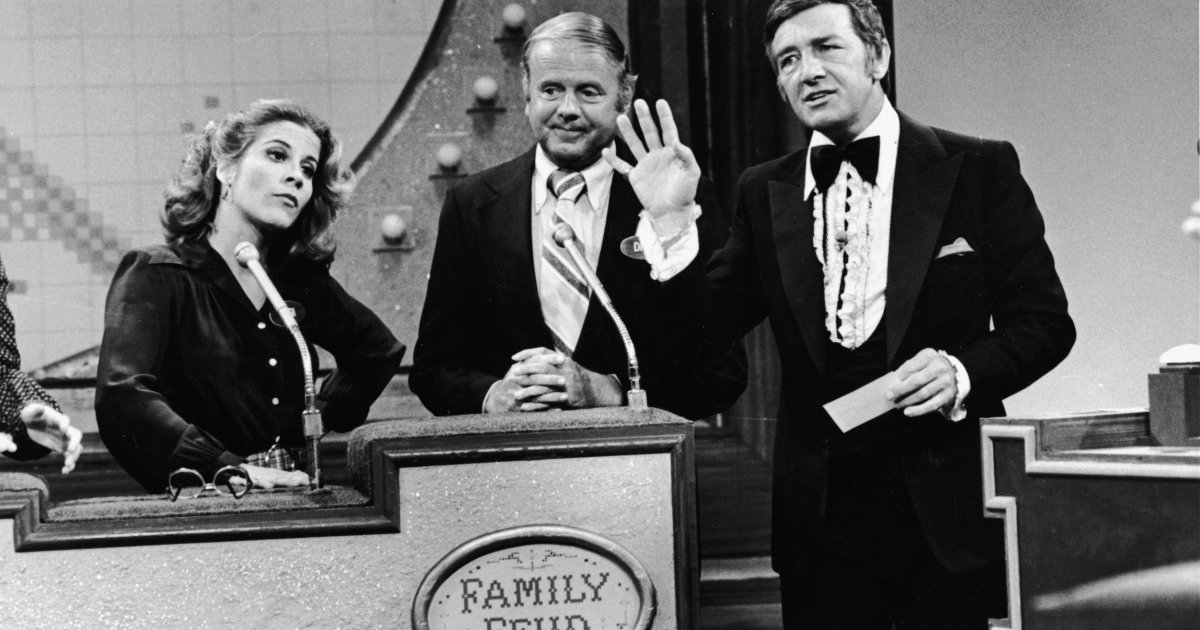A Tragic Loss
- Legendary Family Feud game show host Richard Dawson died nine years ago today from esophageal cancer at 79. The English actor was diagnosed just three weeks before his death.
- Dawson was known for his charming personality and overly-affectionate smooches with female contestants during the ’70s and even met his wife Gretchen on the classic game show when she came on as a contestant.
- Esophageal cancer is a tough diagnosis, but as with many other cancers, it can be treated if caught early. The problem is the symptomsdifficulty swallowing, weight loss, and heartburncan often mimic other diseases, according to a leading thoracic surgeon. Luckily, two recently approved drugs have shown promising hope for this type of cancer.
Tragically, Dawson got diagnosed just three weeks before his death, according to his son.
Read More
Related: Floss Today to Slash Your Chances of Stomach and Esophageal Cancer Tomorrow
His son explained how the tradition started. "There was a girl on the show who was very nervous, and my dad was trying to calm her down. So he said he would give her a kiss for luck, and he did,” he explained. “Then when he went to the next female player, she said, ‘Well, don't I get a kiss?' That's how it started and it just became this thing."
Dawson even met his wife on the show in 1981, when she was a contestant. He and Gretchen Dawson, now 65, had a daughter Shannon together. Dawson and his ex-wife, actress Diana Dors, had sons Gary and Mark.
The former merchant marinewho grew up performing on London’s comedy circuithosted the survey quiz show from 1976 through 1985 and came back for an encore in 1994. The show still lives on today and is now hosted by comedian Steve Harvey, 64.
Understanding Esophageal Cancer
The esophagus is a tube that runs from the throat to the stomach, and cancer cells can form inside the tissues of this organ, which is an important part of your digestive system. Esophageal cancer is more common among men than women. The risk for men in the U.S. is 1 in 125, according to the American Cancer Society (ACS). In 2021, there will be approximately 19,260 new esophageal cancer cases diagnosed in the U.S.
This cancer makes up only 1% of cancers diagnosed in the U.S., and is more common in places like China and India. Survival rates for esophageal cancer have improved over the years as treatments for the disease have improved.
Some people confuse esophageal cancer and throat cancer. The ACS reports that the cause of most esophageal cancers is unknown (though some risk factors, like tobacco use, can increase the likelihood of getting this cancer). Whereas human papillomavirus (HPV), a sexually transmitted virus is a known cause of throat cancer. Esophageal cancer can be treated with surgery, radiation and chemotherapy.
Dr. Brendon Stiles, chief of thoracic surgery at Montefiore Medical Center, explains this difficult disease to SurvivorNet.
“We know that esophageal cancer is a tough one, it’s one of the cancers with one of the lowest cure rates out there,” he says. “But like many cancers, if we find it early, we can often treat it effectively. Either with surgery, or surgery and chemotherapysurgery, chemotherapy and radiation sometimes. My message to patients is the same as it is for most cancers, try to get diagnosed early.”
For esophageal cancers, that means getting an endoscopy if you have any symptoms. An endoscopy is the use of a camera attached to a long, thin tube to look into the esophagus.
The problem with this cancer is it can mimic other diseases. According to Dr. Stiles, symptoms include weight loss, difficulty swallowing and heartburn. Although symptoms like heartburn can often be nothing, it’s always best to get checked to rule out something more serious. The more aware you are, the more persistent you can be with your doctor if you feel there is something not right.
Hope for Esophageal Cancer
There have been two recent immunotherapy drugs approved for esophageal cancer nivolumab (Opdivo) and pembrolizumab (Keytruda) both drugs showed promising study results, and Keytruda showed the most effectiveness earlier in the course of the disease.
"Immunotherapies are being tested not only in metastatic patients, but also in earlier settings combined with chemotherapy," Dr. Rutika Mehta, medical oncologist at Moffitt Cancer Center in Tampa, FL, tells SurvivorNet. "These immunotherapies have a survival benefit."
Related: An Immunotherapy Breakthrough: The Judy Perkins Story
Normally the immune system finds and destroys cancer cells, just as it does bacteria, viruses, and other threats. But when cancers invade the body, they have a sneaky way of preventing the immune system from finding themthey block certain receptors on immune cells.
"Immunotherapy helps to reset that balance," Dr. Mehta says. "It helps to unblock the receptors on immune cells that the cancer cells are blocking." Essentially, this "resets" the immune cells so they can fight the cancer.
Related: Immunotherapy in Recurrence
Some esophageal cancers respond better to immunotherapy than others. Squamous cell cancers are more responsive to this treatment because they already contain a lot of immune cells to activate. These are referred to as "hot tumors."
Immunotherapy doesn't work as well against adenocarcinomas, which make up the majority of esophageal cancers, because they're lower in immune cells. These are known as "cold tumors."
"They need special effort to get the immune system activated to kill cancer cells," Dr. Mehta says.
Treatment Options for Esophageal Cancer
Signs to Look Out For
Learn more about SurvivorNet's rigorous medical review process.


